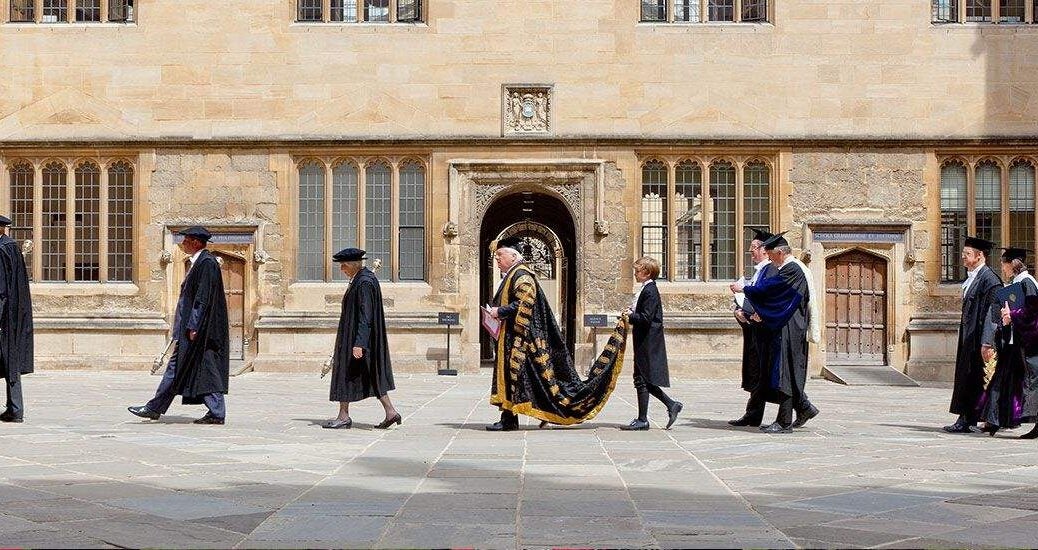
As Martin Scorsese receives an honorary degree from Oxford University in ceremony, Laura Plumley argues that this demonstrates the strength of the British education system
The season of honorary degrees is upon us. This tradition of recognising exceptional and accomplished individuals dates back to the 1400s at Oxford, the oldest university in the English-speaking world. And that fact alone has its pull on the great and good – as was shown in June, at a star-studded ceremony.
This year’s seven recipients at Oxford University were Lord Neuberger (judge); Professor Mary Beard (classicist); Sir Matthew Bourne (choreographer); Professor Helga Nowotny (social scientist); Professor Robert Putnam (social scientist); Mr Martin Scorsese (filmmaker) and Lord Stern (economist). That’s an impressive list and it illustrates the power this long-established tradition has in bringing together people from different walks of life. It’s also a reminder of the strength of the UK education system – and it could hardly be a timelier one as doubts swirl about the nation’s post-Brexit prosperity.
And no one does history quite like the British. Over the centuries the ceremony has been shortened, but the purported ideological premise and the structure have remained constant. In 1478 or 1479, a Doctorate of Canon Law was conferred upon Lionel Woodville, Dean of Exeter, after academic requirements had been waived. This was an unprecedented move and clearly a ploy to curry favour with an extremely influential man. Over subsequent centuries, the conferring of honorary degrees has become a celebration of true achievement. This practice of recognising men – and later, women – who have gained distinction in their chosen field has retained most of the pomp and ceremony of old. It all speaks to a depth of tradition which, you feel, will continue whether we’re in the customs union or not.
The full day of celebrations at Oxford is split into four parts – the Lord Crewe’s Benefaction; the Encaenia Ceremony; the Encaenia Lunch; and the Encaenia Garden Party. The Benefaction takes the form of a reception in one of the Colleges, where a select group, including heads of colleges and the honorands, gather to enjoy peaches, strawberries and champagne. After this, the ceremony ensues, with the congregation processing into the magnificent Sheldonian Theatre to the sound of the organ and trumpet fanfares. The robes worn by the University dignitaries vary greatly – the plain black garb worn by the six Bedels, who also carry silver sceptres, the bright red and grey of the honorands, and finally the richly embroidered golden robe, complete with golden train, of the University’s Chancellor.
And of course the setting of the ceremony also complements the atmosphere of tradition and grandeur. The Sheldonian Theatre has been the location for the Encaenia ceremony since it was completed in 1669. The interior is decorated with many portraits, including that of Gilbert Sheldon (1598 –1677), Warden of All Souls College and then Archbishop of Canterbury. A generous donation from him was used to build the theatre. Other portraits include that of Lord Crewe (1633-1721), who held the offices of Rector of Lincoln College, Bishop of Oxford and Bishop of Durham. These two portraits are positioned to frame the enormous gilded organ. The building was designed by Christopher Wren in the style of the ancient Roman amphitheatres; the ceiling was painted by Charles II’s court painter, Robert Streater, to emulate the sky, thereby emphasising the amphitheatre motif. This grand setting beautifully enhances the celebratory atmosphere of the ceremony.
After the procession, the Public Orator of the University addresses each honorand in Latin. This section of the ceremony sometimes encourages a certain amount of laughter from the seated guests (although perhaps for the wrong reasons), drawing attention to the shortcomings of using a dead language to express contemporary ideas. This year included ‘aBLOGis’ (to mean ‘blog’); and ‘praedoneM OBSTinatum’ (‘career mobster’ from Scorsese’s Goodfellas). During the final part of the ceremony, the Public Orator thanks the University’s donors, recognises outstanding students and summarises the year’s events including funds and bursaries which the University provides. The new degree is then conferred by the Chancellor.
Following the ceremony, the participants attend a sumptuous lunch at All Souls College, where this event has been held for the last 100 years. The cost of this lunch can soar to over £37,000, as in 2012, which seems excessive, considering some members of the University staff are on very low wages. Finally, the Vice Chancellor of the University hosts a garden party for the congregation, to conclude the day’s celebrations.
While this day rightly celebrates the achievements of the distinguished honorands, certain elements of this lavish display of praise – the reams of Latin prose; the ‘no-expenses-spared’ mentality – bring into question whether this ceremony is still fitting for the 21st century. Despite this, Encaenia is a most impressive ceremony and one which inspires the feeling of being part of a tradition, sharing that with students of a bygone age. It also provides the British education system with a sense of continuity and inclusivity with the wide spectrum of honorands valuing this honour and tradition.
Laura Plumley is a writer and intern at Spear’s







